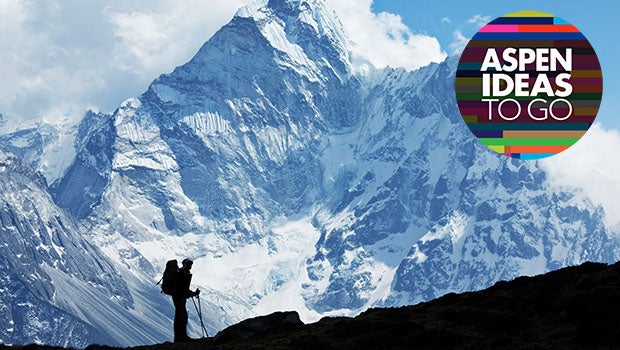Above, participate in a guided meditation and watch the full conversation on world peace with Tibetan lama (high priest) Sakyong Mipham Rinpoche.
Helping to achieve world peace might seem impossible for the average person who isn’t making environmental, trade, or foreign policy decisions. That assumption, however, is completely incorrect, said Sakyong Mipham Rinpoche, a Tibetan lama (high priest) and head of the Shambhala lineage.
Rinpoche guides thousands of students around the world in the path of meditation. In his talk and guided meditation session at the Murdock Mind, Body and Spirit series in Aspen, CO, Rinpoche shared his insights on how we can work towards building peace both within ourselves and society as a whole. While he acknowledges that it will not be easy, he believes that every person can take individual action to improve their lives and the lives of those around them. Humanity is at a crossroads, he said — and it is time to make a change.
“Much of the future of the planet and what is happening is in our hands,” said Rinpoche. “Peace is an idealized version of where we could be. But, if peace is to be sustainable, it has to come from within.”
One of the best ways to combat the current state of the world, Rinpoche explained, is through changing the way that we look at ourselves.
“A lot of the external aggression we see, and the instability, is really a reflection of how we regard ourselves as people — as selfish and faulted,” he said.
But how can we change this view of self? Meditation, correctly done, can trigger the changes necessary to shift one’s view of oneself — and then to project that positive view onto others as well. Though many people view meditation as a retreat from the world, Rinpoche said it should be the opposite: a way to deeply connect with inner thoughts and feelings.
“Meditation should ultimately enable you to relax with who you are,” he continued. “You have to work with your own imperfections and hold them. We have to be able to look at ourselves as basically good — that we are worthy to be, and we have innate dignity as a person. We need to allow ourselves to feel and connect.”
Once you are comfortable with yourself, you will be able to project that onto others. This shift at the individual level can translate into a more harmonious society. If we have a sense and appreciation of our own selves and kindness, we open the pathways to communicate with others — because we care about how we feel, and thus how others feel.
“You can shift at a daily level by empowering the communication, thoughts, and feelings in our mind,” he said. “It may not be dramatic, but all of a sudden it begins to have a very subliminal effect in some ways.”
Ultimately, if we do not look within ourselves first, we will not be able to project the empathy and kindness that we uncover onto others. But once we begin this process, individual actions have a ripple effect on society.
“Peace is a long-term solution and lifestyle… there is no easy fix,” said Rinpoche. “We want things to be quick, but the solutions we need are going to have to be long-term.”

